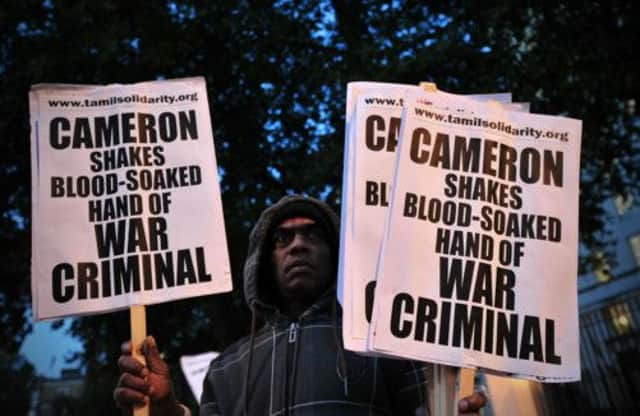Leaders: End brutality must be PM’s Sri Lanka plea


But it is the Sinhalese majority and the Sinhalese ministers who run Sri Lanka who have to acknowledge the abuses occurring in their name and under their authority. There, Mr Cameron’s impact is much more questionable.
The Prime Minister is to be commended for being the first significant government leader to travel to the north. That he did so amidst the ballyhoo of the Commonwealth Heads of Government Meeting ensured that his trip would receive wide publicity, reaching well beyond the Commonwealth and helping to sustain the international pressure on the Sri Lankan government that is needed to stop the torture, rape, and other crimes being committed there.
Advertisement
Hide AdAdvertisement
Hide AdThe value of such a trip is not just in bringing a spotlight to bear on the harrowing plight of the Tamil people. The ghastly stories of people being snatched while doing no more than travelling from place to place, being held captive and not just beaten but also tortured, or repeatedly raped just for being a woman, are too many and too well catalogued for the Sri Lankan government’s protestations of innocence to be credible.
This clearly is an authorised campaign of intimidation, designed to punish an ethnic people long after the war of liberation from, and terrorism against the Sinhalese people, has ended. It is also a campaign of repression, designed to cow a beaten people into a submissive acceptance that they have no rights and that there is no Tamil future.
Mr Cameron heard the stories of brutality for himself and that has value too, for surely no person in his position can fail to have his heart wrenched by hearing such things and then do nothing.
But of course, he then went on to shake the hand of the Sri Lankan president, albeit a little coolly and stiffly. He saw and presumably enjoyed the colour and gaiety of traditional Sri Lankan dance and theatre, including the troops of silken-clad elephants. He then sat down in the president’s company at a sumptuous feast.
These are mixed messages for the Prime Minister to send. The risk is that the one cancels out the other, next to nothing is achieved, and the plight of the Tamils is unrelieved.
Given that Prince Charles is present, representing the Queen as the head of the Commonwealth, Mr Cameron surely had space to do more.
This is a humanitarian tragedy, entirely man-made, and one which does not heal the wounds of war, but which causes them to fester and to corrupt, building up yet more trouble for the future.
It is time to end the brutality and begin the healing, is the message that Mr Cameron should be more forcefully delivering to his hosts.
Heads should share lessons learned
Advertisement
Hide AdAdvertisement
Hide AdGood leadership is as essential to the running of a school as it is to a company. It is, however, a set of skills which is hard to define and perhaps even harder to teach. Often, a good leader is obvious when encountered, but the factors that make the person a good leader are elusive, even to that leader.
Edinburgh City Council has decided that good leaders of schools can be bred, not born, and has sent a clutch of head teachers on a four-day, £1,250 leadership course run by a charity, Columba 1400, on the bonnie banks of Loch Lomond.
Whether or not the setting is idyllic, the course arduous or restful, is immaterial. What matters is value for money. When council budgets are squeezed, are council taxpayers and parents of schoolchildren seeing greater benefits than is being spent on the cost of this course?
There are arguments for these courses. One is that mixing with company executives on a common task enables the sharing of experience and different methods of tackling problems. This is argued to be particularly relevant if the problem is a shrinking budget and expanding demands.
Parents contemplating their own shrinking budgets will be hard to convince. Those who work in the private sector and know only too well the ferocious pressures on them to cut costs and deliver more will regard this as an extra which may be afforded in good times (remember them?) but now as an eminently cuttable cost.
City councillors should reconsider this programme. Some 30 head teachers have already been through it. Perhaps they can communicate the lessons learned to the remaining 104 being considered for it. They are teachers, after all.